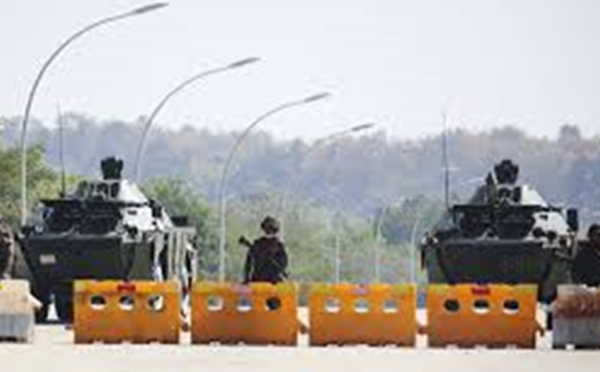Myanmar and its history of Military coups
Posted on : February 8, 2021Author : AGA Admin

Myanmar is not new to military coups. The recent incident in Myanmar corroborated this fact when Myanmar’s military- Tatmadaw- grabbed power in a coup on 1st February 2021, the third time in the nation’s history since its independence from the British rule in 1948. So let’s first dive into Myanmar’s history of coups.
Myanmar, then known as Burma, became an independent nation in 1948 with U Nu heading the government and the ruling Anti-Fascist People’s Freedom League (AFPFL) which had resisted the Japanese occupation with help from the British Empire. The ingress of military into state politics for the first time was in 1958, when following a split in the AFPFL, the Chief of Staff General Ne Win was asked to serve as the interim Prime Minister. Ne Win had total control over the Army which he restructured along socialist lines. In the 1960 elections as U Nu emerged victorious, Ne Win handed him back the governance. However, two years later in 1962, Ne Win snatched back the power by leading a “bloodless coup”. He brought a mixture of Buddhism and Socialism in Burma, dismantled the federal structure and installed the Socialist Programme Party (SPP) as the only legal party in the state. The coup arose partly from the fears that the civilian government was failing to crack down harshly upon the ethnic minority movements and their associated armed wings.
General Ne Win followed an isolationist policy for Burma for the next two decades. This included nationalising the economy, banning free media, expelling foreigners, and jailing political adversaries. Sluggish economy, rampant inflation, and repeated demonetisations to curb the black market led to the rise of massive anti-government riots in which thousands of people were killed. There was a rising resentment amongst the pro-democracy groups against the military rule’s economic mismanagement and heavy-handedness. In August 1988, mass protests led to the deposing of Ne Win, only for a new military junta, headed by General Saw Maung, to take power. It was around this time that Aung San Suu Kyi, daughter of the assassinated AFPFL leader Aung San, co-founded the National League of Democracy (NLD) with an aim to bring back democracy without any military intervention.
The military junta held democratic elections in 1990 in which the NLD party of Suu Kyi won. The junta refused to accept this result and nullified the elections, arrested many many opposition party members and placed Suu Kyi under house arrest. Which continued for two decades.
Following new waves of mass protests in 2007, Myanmar’s military leadership again took steps towards multi-party democracy and civilian rule but at the same time, ensured that it did not lose its grasp of power. The junta proposed a new constitution with a quarter of seats being allocated to the military and banned Suu Kyi from participating in the elections.
The first democratic elections in 20 years was held in 2010 where the military-backed Union Solidarity and Development Part (USDP) won the majority and the former military General Thein Sein took power, though the opposition groups alleged this election as fraud.
Soon after the 2010 elections, Suu Kyi was released from detention along with other political leaders. She rejoined politics and the NLD party re-registered as a political party. In the 2015 elections, the Suu Kyi-NLD won majority seats and formed a democratically elected government and Suu Kyi was appointed as the State Counsellor of Myanmar. However, still the Tatmadaw refused to accept the civil rule and continued to pursue its offensive and aggressive agenda against the Rohingya minority groups.
Again in the 2020 elections, the NLD pulled off a better performance than it did in 2015 while the military-backed USDP, the NLD’s primary opposition, suffered a humiliating defeat. The USDP refused to accept this and demanded a rerun of the vote, claiming widespread fraud. Myanmar’s Election Commission dismissed the allegations and re-endorsed the results. A crisis has been brewing in the country between the military and democratically-elected government of NLD since the latter took power in the 2020 elections.
On 1st February 2021, the coup was staged just hours before the new session of Parliament was to convene. Suu Kyi is again put under house arrest and several other NLD officials have been detained. Several charges have been filed against her including breaching import and export laws and possession of unlawful communication devices. The military also declared a one-year state of emergency, stating that the NLD government failed to act on its complaints on voter fraud.
No major violence has been reported. Soldiers are patrolling the streets and night-time curfew is in force. International and domestic TV channels went off air. Internet and phone services are disrupted and banks have been forced to close. The military announced replacements for a number of ministries and has talked about conducting elections after the state of emergency. The NLD, meanwhile, has called for protests against the military coup.
After the NLD’s landslide victory, the junta might have sensed that the limited democratic experience in Myanmar was threatening the military’s interest to be in power. Moreover, the junta was unhappy with Suu Kyi’s popularity among the masses. The Myanmar’s military coup has garnered condemnations from leaders across the world, with the former US President Barack Obama reacting strongly to it while India has expressed “deep concern” regarding the situation. The situation in Myanmar is extremely vulnerable at the moment.
Ankita Chatterjee
Intern, Asia in Global Affairs





Leave a Reply